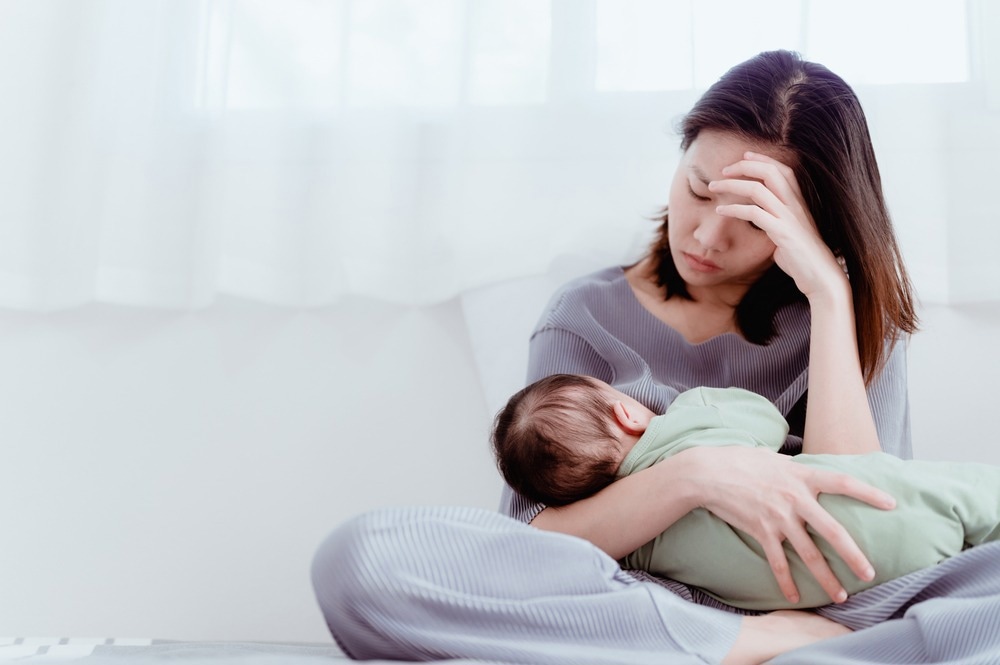In a recent study published in JAMA Network Open, researchers assessed the relationship between coronavirus disease 2019 (COVID-19)-associated stress in the antenatal period and the mental well-being of mothers and their infants in the postpartum period.

Background
Studies have reported that antenatal stressors significantly increase the risk of adverse postpartum outcomes regarding mental well-being, such as cognitive and behavioral problems among infants. Cases of anxiety and depression during pregnancy have significantly increased during the severe acute respiratory coronavirus 2 (SARS-CoV-2) pandemic, with lowered positive affectivity, worsened orienting behavior, and higher surgency among infants.
However, the association between COVID-19-associated stress and postpartum maternal and infant outcomes is not completely understood. Previous studies evaluating the effects of antenatal stressors on maternal and infantile health outcomes were largely cross-sectional, single-center, retrospective, with small sample populations, and often utilized unvalidated assessment measures with no documentation of psychometric properties.
About the study
In the present longitudinal survey-based study, researchers evaluated the impact of antenatal SARS-CoV-2 infection-associated stress on postpartum maternal and infant mental health outcomes.
The study comprised 318 individuals aged ≥11.0 years who participated in the coronavirus disease 2019 risks across lifespan (CORAL) study conducted in the United Kingdom (UK), United States (US), and Australia. Females who were expecting at the initial evaluation between 5 May and 30 September 2020 and completed two follow-up evaluations between 28 October 2021 and 24 April 2022 at three-month intervals were considered for the analysis.
In addition, the participants were invited to fill out a fourth survey on maternal mental well-being and infant temperament in the follow-up period. COVID-19-associated stress levels were evaluated using the pandemic anxiety measurement scale. The team used the eight-component patient health questionnaire to assess depression among mothers and the seven-component general anxiety disorder (GAD) scale to assess generalized anxiety levels.
During follow-ups, postpartum distress levels were evaluated using the 10.0-component postpartum distress assessment measure, and health outcomes among infants were assessed using the Infant Behavior questionnaire. Individuals were recruited for the study through paid advertising, social media, mothers' group newsletters, mental well-being organizations, and web-based pregnancy forums.
Linear mixed-effects modeling was performed for the analysis. Sensitivity analyses were performed controlling for maternal mental health at initial evaluation and COVID-19 risks experienced during pregnancy and the age of the infants during follow-up assessments. The study participants were provided Amazon gift vouchers of A$100 for the initial survey and A$20 for follow-up surveys.
Results
The mean age of the study participants was 32 years, and among the study participants, 28% (n=88), 30% (n=94), and 43% (n=136) resided in Australia, the United States, and the United Kingdom, respectively, among whom, 87% (n=276) were White, and 81% (n=256) had university degrees. A history of psychiatric disorders was reported by 36% (n=114) of the study participants.
Other races and ethnicities included in the sample population were Aboriginal or Torres Strait Islander, Asian, Hispanic, mixed, or other, among two, 12, eight, seven, and 10 participants, respectively. High school education was attained by 19 women and professional or vocational training by 41 women.
At the initial evaluation, the mean values for the number of children and the gestational age (in months) were 1.20 and 5.80, respectively. At the final evaluation, the mean infant age was 14 months. COVID-19-associated stress in the antenatal period showed significant associations with distress, anxiety, and depression among mothers and negative affectivity among infants in the postpartum period. Sensitivity analyses yielded similar findings.
At the initial evaluation, three women showed mild GAD and depression (mean scores on the GAD-7 scale and Patient Health questionnaire of 6.70 and 7.80, respectively), and symptoms remained elevated for 17.0 months postpartum. There were no interactive associations between the age of the infants and antenatal SARS-CoV-2 infection-associated stress with infant health outcomes.
Conclusions
Overall, the study findings showed that antenatal pandemic-associated stressors must be targeted to improve mothers' and infants' postpartum outcomes. Expecting women must be considered vulnerable and prioritized during COVID-19 and other pandemics and provided appropriate care for physical and mental well-being.
Further research must be conducted to determine methods of reducing pandemic-associated stress to promote maternal and neonatal well-being in the postpartum period. The long-term relationships between SARS-CoV-2 infection-associated stress and maternal and neonatal health must be assessed.
Psychological and biological vulnerability markers among a more diverse group of pregnant women belonging to different ethnicities and residing in different geographical regions must be identified to personalize antenatal healthcare.
- Schweizer, S. et al. (2023) "Association of Antenatal COVID-19–Related Stress With Postpartum Maternal Mental Health and Negative Affectivity in Infants", JAMA Network Open, 6(3), p. e232969. doi: 10.1001/jamanetworkopen.2023.2969. https://jamanetwork.com/journals/jamanetworkopen/fullarticle/2802388
Posted in: Medical Science News | Medical Research News | Women's Health News | Disease/Infection News
Tags: Anxiety, Anxiety Disorder, Children, Coronavirus, Coronavirus Disease COVID-19, covid-19, Depression, Education, Healthcare, Mental Health, Pandemic, Pregnancy, Research, Respiratory, SARS, SARS-CoV-2, Severe Acute Respiratory, Stress

Written by
Pooja Toshniwal Paharia
Dr. based clinical-radiological diagnosis and management of oral lesions and conditions and associated maxillofacial disorders.
Source: Read Full Article